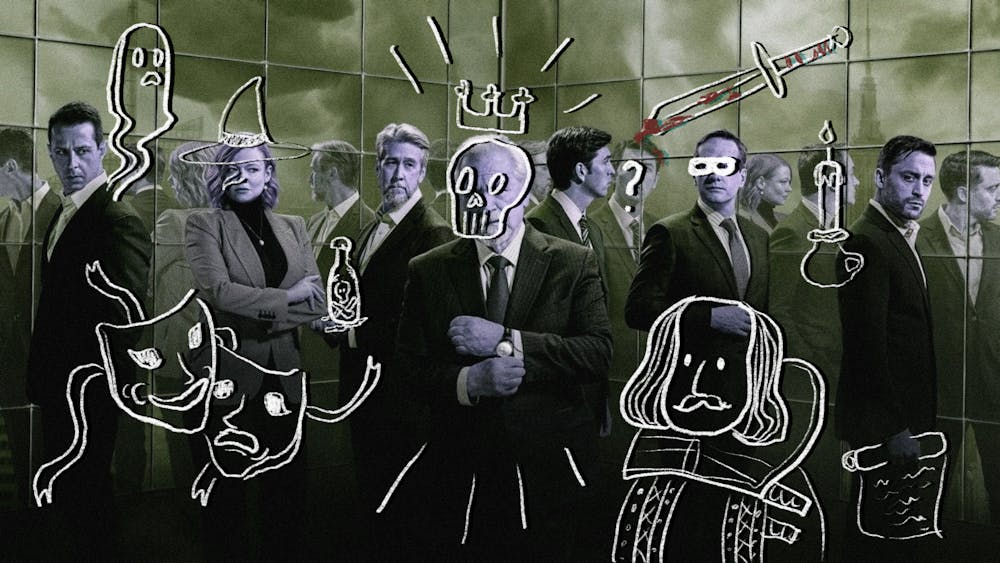*This article contains spoilers for Season 4 of Succession*
In the penultimate episode of HBO’s hit series Succession, we see a funeral for Logan Roy, the family patriarch and modern business tycoon who built an empire that his children are now squabbling over the control of. It is here that Roman Roy—Logan’s youngest son and a goofy playboy with a wildly unique insult ready for any situation—shows something rare for any member of the Roy family: genuine emotion. While just a few sentences into delivering a eulogy for his father, Roman breaks down in tears at the sight of Logan’s coffin and has to be consoled by his siblings, who ultimately deliver speeches in his stead. While it would be normal for a child to cry at a parent’s funeral, Roman is not a normal child, and these are not normal tears. Born into exceptional wealth, these tears just destroyed his chance of inheriting his father's company.
This moment illustrates one of the fundamental conceits of Succession brilliantly. The show is about big, heady topics: corporate America’s role in our world, and the job that the news media has to play in a post–truth America. But it is also a melodrama. And these twin genres—grand scale political drama and soap opera—complement each other beautifully.
Via this lens of melodrama, Roman’s breakdown at his father’s funeral is more impactful. Roman serves as a primary comic relief throughout the show, repeatedly claiming to have “pre–grieved” Logan’s passing. And at the helm of a cable news network during an election, he makes crucial decisions about the future of the United States without much emotion, even with scorn for the average voter. But when he’s faced with his dead father in a casket before him, this public–facing persona just melts away, and we see him reduced to his true self.
It is here that Succession makes an interesting point—it’s impossible to either fake or conceal the raw emotions grief stirs up. This point becomes even more salient since it is Roman—and not his more serious siblings Connor, Kendall, or Siobhan—sobbing and reduced to a shell of himself. Not only that, but in the eyes of the hundreds of dignitaries, politicians, and business leaders in the audience, and in Succession’s rarified corporate world, any sign of emotion is considered a weakness. Naturally, Kendall’s stoic speech is the one which gets the praise. He is the one the audience would least expect to be in this circumstance, and that’s what makes it all the more impactful.
This blending between political drama and melodramatic emotions is also incredibly apparent throughout the relationship between Shiv and her husband Tom, a well–intentioned corporate climber. As the show progresses, Tom transforms from a bumbling suck–up seen as only dating Shiv for her family into a ruthless company man, culminating with his appointment as CEO—where he will have much more power than his wife—in the series finale. There are many moments in their relationship that could be taken right out of any modern soap opera, but one that stands out is when she asks him to have an open marriage on their wedding night, a conversation more characteristic of daytime TV than primetime prestige drama.
The audience sees in real time how their partnership grows more and more strained, and how any attempts toward the emotional honesty typical in a marriage are subsumed into the relentless desire for victory, whether it be corporate or personal. This is illustrated best in a fight the two have during season four, episode seven, when Tom refuses to believe that Shiv is pregnant, opting instead to tell her to her face that it’s just another ploy to gain his attention and win points. Even the most soap opera plot line in the entire show—a surprise baby!—melts away in a post–truth America. Every character in the show is so conditioned to lying and manipulation that even the most sacred conversation topics are treated with little more than incredulity. In the dog–eat–dog reality of Succession, literally anything can be used as a bargaining chip or—even worse—a ruse to increase credibility.
This discussion of our post–truth world extends beyond just its characters, and into how it can satirize the real world. For example, in season four, episode eight—which centers on an election—there is satirical comedy about the newsroom’s role in shaping election narratives, from hapless Cousin Greg putting wasabi in the eyes of an analyst (portrayed as the epitome of wonky political number–cruncher) to a decision about calling an election devolving into petty sibling drama among top company executives.
In the moment, it’s hard not to shake one’s head at the on–screen action because of how nonsensical it sometimes seems, such as when Greg immediately pours a citrus–flavored La Croix into the wasabi–burned eyes of said political analyst. But it also carries prescient parallels to issues that were faced in 2020 and which could very well be prevalent moving forward, such as political violence around counting centers and certain factions refusing to accept election results.
It’s through this blending of serious issues and often–comedic melodrama that Succession becomes more than the sum of its parts; this is what allows it to be more accessible than The Wire yet simultaneously more poignant and impactful than Yellowstone. There are many elements of Succession that normal viewers wouldn’t normally care about, but when it’s driven by relatable struggles, they become instantly relatable. And framing America’s political and social scene in the squabbles of one family both makes things more emotionally coherent and gives us insight into how regardless of class, race, gender, or any other stratifier, we are all impacted. Because for every corporate Bear Hug there’s a game of Boar on the Floor, and for every presidential election there’s a pornographic image sent to a parent.







